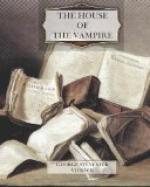“I am so happy you came,” Reginald Clarke said, as he conducted Ernest into his studio. It was a large, luxuriously furnished room overlooking the Hudson and Riverside Drive.
Dazzled and bewildered, the boy’s eyes wandered from object to object, from picture to statue. Despite seemingly incongruous details, the whole arrangement possessed style and distinction.
A satyr on the mantelpiece whispered obscene secrets into the ears of Saint Cecilia. The argent limbs of Antinous brushed against the garments of Mona Lisa. And from a corner a little rococo lady peered coquettishly at the gray image of an Egyptian sphinx. There was a picture of Napoleon facing the image of the Crucified. Above all, in the semi-darkness, artificially produced by heavy draperies, towered two busts.
“Shakespeare and Balzac!” Ernest exclaimed with some surprise.
“Yes,” explained Reginald, “they are my gods.”
His gods! Surely there was a key to Clarke’s character. Our gods are ourselves raised to the highest power.
Clarke and Shakespeare!
Even to Ernest’s admiring mind it seemed almost blasphemous to name a contemporary, however esteemed, in one breath with the mighty master of song, whose great gaunt shadow, thrown against the background of the years has assumed immense, unproportionate, monstrous dimensions.
Yet something might be said for the comparison. Clarke undoubtedly was universally broad, and undoubtedly concealed, with no less exquisite taste than the Elizabethan, his own personality under the splendid raiment of his art. They certainly were affinities. It would not have been surprising to him to see the clear calm head of Shakespeare rise from behind his host.
Perhaps—who knows?—the very presence of the bust in his room had, to some extent, subtly and secretly moulded Reginald Clarke’s life. A man’s soul, like the chameleon, takes colour from its environment. Even comparative trifles, the number of the house in which we live, or the colour of the wallpaper of a room, may determine a destiny.
The boy’s eyes were again surveying the fantastic surroundings in which he found himself; while, from a corner, Clarke’s eyes were watching his every movement, as if to follow his thoughts into the innermost labyrinth of the mind. It seemed to Ernest, under the spell of this passing fancy, as though each vase, each picture, each curio in the room, was reflected in Clarke’s work. In a long-queued, porcelain Chinese mandarin he distinctly recognised a quaint quatrain in one of Clarke’s most marvellous poems. And he could have sworn that the grin of the Hindu monkey-god on the writing-table reappeared in the weird rhythm of two stanzas whose grotesque cadence had haunted him for years.
At last Clarke broke the silence. “You like my studio?” he asked.
The simple question brought Ernest back to reality.
“Like it? Why, it’s stunning. It set up in me the queerest train of thought.”




